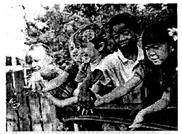题目内容
Conjoined twins lead separate but active lives.
Lori and Reba have never been alone and they want to keep it that way.
The 40-year-old conjoined twins in Pennsylvania,US,have read about others locked together by an accident of birth who have been medically separated.But they insist only death can part them.
“We’ve never imagined a life divided,”Lori said.
Lori and Reba are joined together at the side of their heads,facing in opposite directions.Their blood supply is partly linked,but each has a separate brain.
Reba suffers from a disease which has left her completely dependent on her sister.
Lori wheels her everywhere they go in different professional directions.Lori worked in a laundry room at a hospital for six years before giving that up to allow Reba to try to become a country singer.
Her first song is called “The Fear of Being Alone”,which was inspired by Reba and Lori’s desire for togetherness.
Reba’s career has taken her across the United States, Europe and parts of Asia.
While the twins receive some money from the government, the earning from Reba’s concerts go to AIDS and cancer charities(慈善机构).
The sisters have set goals for themselves. Reba looks forward to a successful career as a country singer, while Lori says she hopes to get married and have children.Lori said,”So when it comes, it comes. Meanwhile, I live wonderfully from day to day.”
小题1:When Lori said “We’ve never imagined a life divided”,she meant that .
小题2:By leading separate lives,the topic means that .
A . either of the two can look after herself B .the twins do different things
. either of the two can look after herself B .the twins do different things
C. they face in opposite directions D. they are no longer conjoined now
小题3:When Reba gives performances as a country singer,Lori .
小题4:The twins lead active lives because they .
小题5:From the last paragraph we can understand that Lori .
A. thinks it’s too late for her to have children
B. is sure she’ll get married and have children
Lori and Reba have never been alone and they want to keep it that way.
The 40-year-old conjoined twins in Pennsylvania,US,have read about others locked together by an accident of birth who have been medically separated.But they insist only death can part them.
“We’ve never imagined a life divided,”Lori said.
Lori and Reba are joined together at the side of their heads,facing in opposite directions.Their blood supply is partly linked,but each has a separate brain.
Reba suffers from a disease which has left her completely dependent on her sister.
Lori wheels her everywhere they go in different professional directions.Lori worked in a laundry room at a hospital for six years before giving that up to allow Reba to try to become a country singer.
Her first song is called “The Fear of Being Alone”,which was inspired by Reba and Lori’s desire for togetherness.
Reba’s career has taken her across the United States, Europe and parts of Asia.
While the twins receive some money from the government, the earning from Reba’s concerts go to AIDS and cancer charities(慈善机构).
The sisters have set goals for themselves. Reba looks forward to a successful career as a country singer, while Lori says she hopes to get married and have children.Lori said,”So when it comes, it comes. Meanwhile, I live wonderfully from day to day.”
小题1:When Lori said “We’ve never imagined a life divided”,she meant that .
| A.they don’t wish to be made separate |
| B.they think their case is beyond medical help |
| C.independent life would be too good to think of |
| D.they would die once separated |
A
 . either of the two can look after herself B .the twins do different things
. either of the two can look after herself B .the twins do different thingsC. they face in opposite directions D. they are no longer conjoined now
小题3:When Reba gives performances as a country singer,Lori .
| A.works in a hospital | B.continues her college education |
| C.brings up her children | D.looks after her sister |
| A.are tired of staying at home doing nothing |
| B.need more money |
C.want to prove themselve s as useful citizens s as useful citizens |
| D.have to earn their own bread |
A. thinks it’s too late for her to have children
B. is sure she’ll get married and have children

小题1:A小题1:B小题1:D小题1:C小题1:C
略

练习册系列答案
 金钥匙试卷系列答案
金钥匙试卷系列答案
相关题目
 self-control than others.Now,a new study that began with about 1,000 children in New Zealand has tracked how a child’s low self-control can predict poor health,money troubles and even a criminal record in their adult years.
self-control than others.Now,a new study that began with about 1,000 children in New Zealand has tracked how a child’s low self-control can predict poor health,money troubles and even a criminal record in their adult years. why some children have better self-control than others,though she said other researchers have found that it’s mostly a learned behavior,with relatively little genetic influence.But good self-control can be set to run in familles because children with good self-control are more likely to grow up to be healthy and prosperous parents.But the good news,Moffitt said,is that self-control can be taught by parents,and through school curricula that have been shown to be effective.
why some children have better self-control than others,though she said other researchers have found that it’s mostly a learned behavior,with relatively little genetic influence.But good self-control can be set to run in familles because children with good self-control are more likely to grow up to be healthy and prosperous parents.But the good news,Moffitt said,is that self-control can be taught by parents,and through school curricula that have been shown to be effective. gest how to offer recreation activities around home
gest how to offer recreation activities around home h?
h? ing is 95 percent or more,you can change roles;the new Talker can continue with the same topic or move on to something entirely new.
ing is 95 percent or more,you can change roles;the new Talker can continue with the same topic or move on to something entirely new. iture. And d
iture. And d ect their lambs in winter.
ect their lambs in winter.